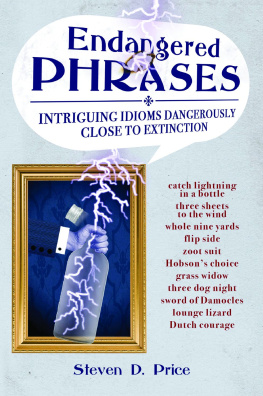ALSO BY MARK ABLEY
The Tongues of Earth: New and Selected Poems
Conversations with a Dead Man: The Legacy of Duncan Campbell Scott
The Prodigal Tongue: Dispatches from the Future of English
The Silver Palace Restaurant
Spoken Here: Travels Among Threatened Languages
Glasburyon
Blue Sand, Blue Moon
Beyond Forget: Rediscovering the Prairies

Simon & Schuster Canada
A Division of Simon & Schuster, Inc.
166 King Street East, Suite 300
Toronto, Ontario M5A 1J3
www.SimonandSchuster.ca
Copyright 2018 by Mark Abley
All rights reserved, including the right to reproduce this book or portions thereof in any form whatsoever. For information, address Simon & Schuster Canada Subsidiary Rights Department, 166 King Street East, Suite 300, Toronto, Ontario, M5A 1J3, Canada.
This Simon & Schuster Canada edition October 2018
SIMON & SCHUSTER CANADA and colophon are trademarks of Simon & Schuster, Inc.
For information about special discounts for bulk purchases, please contact Simon & Schuster Special Sales at 1-800-268-3216 or
Illustrations by Belle Wuthrich (www.bellewuthrich.com)
Cover image: Shutterstock / Kuttelvaserova Stuchelova
Cover design: David Gee
Library and Archives Canada Cataloguing in Publication
Abley, Mark, 1955, author Watch your tongue : what our everyday sayings and idioms figuratively mean / Mark Abley.
Issued in print and electronic formats.
ISBN 978-1-5011-7228-1 (softcover).ISBN 978-1-5011-7229-8 (ebook)
1. English languageIdioms. 2. English languageTerms and phrases. 3. English languageHistory. 4. English languageSocial aspects. 5. Clichs. 6. Figures of speech. I. Title.
PE1460.A25 2018 428 C2018-902314-7 C2018-902315-5
ISBN 978-1-5011-7228-1
ISBN 978-1-5011-7229-8 (ebook)
For all the teachers who give their students the chance to find joy in words
Key to Sidebars

| Combing the Giraffe Foreign idioms |

| Donkeys Hind Leg Outdated idioms |

| Household Names Idioms from names |

| It Is Written Biblical idioms |

| Merchant of Words Idioms from Shakespeare |

| Spoonfuls of Sugar Language trivia |

| Tomatoes on Your Eyes Nonsense idioms |
Raining Glass
I t was a blue winter day in downtown Montreal, and I was standing among thousands of other shivering people on the citys main shopping street. We had gathered in solidarity with the Womens March on Washington, the day after the inauguration of Donald Trump as US president. A local gaggle of the activist group the Raging Grannies sang a homemade ditty to the tune of Oh! SusannaWomens power, were here to make a stir / Dont mess around with womens rights, we roar as well as purr. Cat motifs were in evidence throughout the rally, notably in the form of knitted, pink pussy hatsa response to the incoming presidents vulgar boasting about his sexual conquests.
What struck me, as I looked around, was the language on the hundreds of cardboard placards. Some were direct and blatant anti-Trump slogans. But many of the signs, like the grannies song, used more subtle, idiomatic language to make their point. Pussy hat was itself an idiom, and one big sign hoisted by a woman standing a few yards away from me said, Pussy grabs back. Placards reading Love is power, The future has no gender and Walls wont divide us seemed like optimistic attempts to spread new proverbs. Girls just want to have fundamental rights was a clear spin-off from the old Cyndi Lauper hit Girls Just Want to Have Fun. Post-Truth = Lies made a terse comment on a recently coined expression, post-truth.
My favorite placard, being waved to and fro in the cold air as the Raging Grannies warbled on, read: I wont stop till it rains glass. It was a brilliant play on words. But unless you grasped the meaning of the expression glass ceilingthe invisible, powerful barrier that Hillary Clinton had hoped to shatterthe sign would have made no sense.
The language play so noticeable on these signs was evidence of hope, I thought. Even at a time of immense concern about the future, hundreds of people at the rally had gone to the trouble of making placards that displayed a frisky, defiant creativity. Gatherings in other cities brought forth equally inventive signs: Free Melania, He shall overcomb, Keep your tiny hands off my human rights, and so on. The people who invented these expressions and held these signs were refusing to let anxiety or depression override their urge to find words adequate for the challenge.
Thats a very human impulse, one with a long and glorious history. Soldiers in the trenches during the First World War scribbled away in damp notebooks. Prisoners in Nazi concentration camps and the Stalinist gulag wrote on whatever materials they could find: scraps of paper, candy wrappers, toilet paper, even stone walls. Human beings are creatures of language. We speak, therefore we are.
And when we speak or write, we often resort to idioms. We use words not just in a factual wayDont let the dog off the leashbut also in an idiomatic way: Dont be a dog in the manger. Idioms are small artifacts of imagination. They encapsulate and sum up aspects of our experience. Whatever genre they fall intominiature poems, sermons, jokes or warningsthey can keep time in abeyance. Clothes and furnishings, even those from recent years, are regularly consigned to the thrift store or the garbage, but idioms from the distant past still trickle through our lips and ears. Many English expressions that are familiar today (dog in the manger among them) were well known in the Middle Ages or the Renaissance.
Language is always evolving, but some of these idioms show an impressive capacity to resist change. Ever since William Shakespeare was a child, long before Samuel de Champlain or the Pilgrim Fathers set off across the Atlantic, a selfish or spiteful person has been said to take a dog-in-the-manger view. Never a cat in the manger. Never a dog in the stable. Never two dogs in the manger.
Not all idioms survive, of course. Technological change has rendered many of them obsolete. Its only members of a rapidly aging generation who are likely to recall what a Kodak moment is, or was. Likewise, the expression Hold your horses! made sense in previous centuries, when horses were abundant in cities and a necessity of rural life. A person who offered this advice to the driver of a wagon or cartor to anyone elsewas saying, Be patient! Slow down! But to shout Hold your horses! in the twenty-first century would be to sound irredeemably old-fashioned.
Next page















